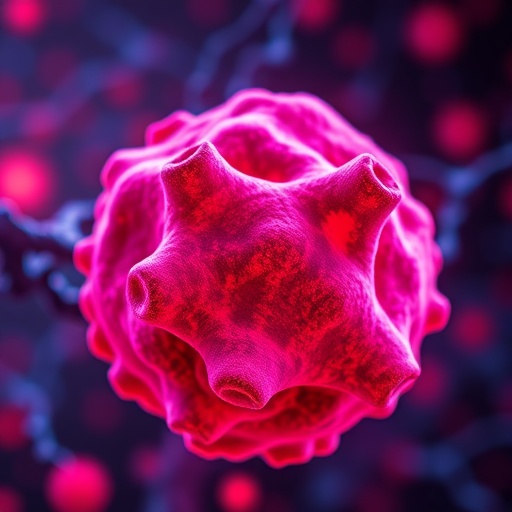
The emerging landscape of cancer research has shifted toward a nuanced understanding of metabolic pathways and their implications for tumor progression. A ground-breaking study by Wang et al. sheds light on the multifaceted roles of branched-chain amino acids (BCAAs) in cancer metabolism, presenting a comprehensive analysis that could redefine therapeutic strategies in oncology. This research underscores the integral connection between metabolic processes and cancer biology, suggesting that BCAA metabolism is not merely a byproduct of tumorigenesis but a critical network in tumor growth and proliferation.
At the core of this investigation is the recognition that BCAAs, which include leucine, isoleucine, and valine, are essential amino acids involved in numerous physiological functions. The study reveals that altered BCAA metabolism is closely associated with various cancer types, including breast, prostate, and liver cancers. This metabolic dysregulation provides cancer cells with not only the necessary building blocks for protein synthesis but also energy, signaling, and the capacity to adapt to hostile microenvironments. The ability of tumors to hijack BCAA metabolism highlights the complexity of cancer as a metabolic disease.
The study’s authors utilized both in vitro assays and in vivo models to delve into the effects of BCAA availability and metabolism on tumor cells. They reported that varying levels of BCAAs could significantly influence tumor cell growth and survival. For instance, leucine, the most studied BCAA, activates the mTOR (mammalian target of rapamycin) pathway, a critical regulator of cell growth and metabolism. Enhanced mTOR signaling, in turn, fosters an environment conducive to tumor growth by promoting protein synthesis and cellular proliferation while inhibiting autophagy and apoptosis. This paradigm shift emphasizes the role of nutrient sensing in the regulation of cancer cell behavior.
Moreover, Wang et al. meticulously investigated the interplay between BCAAs and other metabolic pathways, particularly within the framework of the Warburg effect—where cancer cells preferentially utilize glycolysis over oxidative phosphorylation, even in the presence of oxygen. They uncovered that the catabolism of BCAAs could directly influence glucose metabolism, thereby positioning BCAAs as key players in driving the metabolic reprogramming characteristic of cancer cells. This interplay elucidates how tumors can optimize their energy production and maintain growth under varying nutrient availability.
The authors also brought attention to the role of BCAA supplementation, both in dietary and clinical contexts, and its implications for cancer progression. While BCAA supplementation is often promoted for muscle growth and recovery, its potential effects on tumor growth create a paradox. The simplistic view of BCAAs as benign nutrients could overshadow their dualistic role in cancer metabolism. As patients with heightened BCAA levels may experience accelerated tumor growth, it raises critical questions about dietary recommendations for cancer patients.
Additionally, the findings underline the intricate relationship between tumor microenvironments and BCAA metabolism. Tumor-associated macrophages (TAMs) and other immune cells can alter local BCAA availability, impacting tumor cell behavior. This suggests that the modulation of immune cells to either limit or enhance BCAA metabolism could be a therapeutic strategy. Such insights encourage a broader exploration of how metabolic interventions can orchestrate immune responses within the tumor niche.
Interestingly, the study extends its reach beyond succinct metabolic pathways, addressing broader implications for precision medicine. By understanding individual metabolic profiles related to BCAA metabolism, oncologists may forecast tumor behavior and devise tailored therapeutic approaches. Such precision strategies could encompass dietary modifications, pharmacological inhibitors of BCAA catabolism, or agents targeting the mTOR signaling pathway—each route aimed at disrupting the metabolic advantages that cancer cells exploit.
Collating evidence from diverse cancer types indicates that the metabolic signatures associated with BCAAs could serve as biomarkers, guiding clinical decisions. The study posits that patients with specific metabolic profiles may respond distinctly to existing therapies, paving the way for personalized treatment paradigms. This tailored approach recognizes that no two patients experience cancer in the same manner, emphasizing the need for individualized therapeutic strategies based on metabolic characterization.
As ongoing research continues to elucidate the complexities of BCAA metabolism in cancer, researchers are urged to navigate these findings cautiously. While the study presents a compelling case for the association between BCAA metabolism and tumor progression, further investigations are warranted to dissect the causal relationships underlying these observations. Longitudinal studies could provide insights into how metabolic alterations evolve throughout tumorigenesis and influence treatment responses.
Moreover, the implications of BCAA metabolism extend beyond cancer to other diseases characterized by metabolic dysregulation, such as obesity and diabetes. Understanding shared metabolic pathways may unveil common therapeutic targets, transforming how metabolic disorders and cancer are addressed simultaneously. This cross-disciplinary approach can foster innovative strategies to combat diseases characterized by aberrant metabolism.
In conclusion, the comprehensive analysis by Wang et al. represents a significant advancement in our comprehension of tumor metabolism, specifically regarding the roles of branched-chain amino acids. It offers a paradigm through which researchers and clinicians can rethink cancer treatment by incorporating metabolic interventions. As the landscape of cancer metabolism continues to expand, the actionable insights drawn from BCAA research may herald a new chapter in oncology, integrating nutrition, metabolism, and immunology into cancer care.
Research into BCAA metabolism remains crucial for future endeavors in cancer therapeutic strategies. With the continual evolution of understanding around metabolic contributions to tumor biology, a more intricate and refined approach to cancer treatment may emerge, offering hope not only for better outcomes but also for a deeper comprehension of the metabolic underpinnings of various malignancies.
Subject of Research: The roles of branched-chain amino acid metabolism in tumor progression.
Article Title: Multiple roles of branched-chain amino acid metabolism in tumour progression.
Article References:
Wang, L., Shi, F., Cao, Y. et al. Multiple roles of branched-chain amino acid metabolism in tumour progression.
J Biomed Sci 32, 41 (2025). https://doi.org/10.1186/s12929-025-01132-y
Image Credits: AI Generated
DOI: 10.1186/s12929-025-01132-y
Keywords: BCAA metabolism, cancer therapy, tumor progression, metabolic pathways, precision medicine
Tags: BCAA metabolism and tumor growthbranched-chain amino acids in cancercancer metabolism researchcancer types linked to BCAAsenergy signaling in cancer cellsessential amino acids and tumor proliferationin vitro and in vivo cancer studiesleucine isoleucine valine rolesmetabolic disease and cancer biologymetabolic dysregulation in cancermetabolic pathways in oncologytherapeutic strategies for cancer treatment




